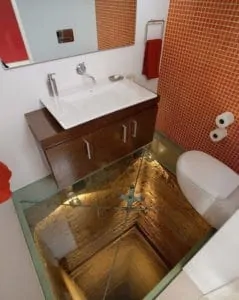
- By Remodel Works
- In Blog
Basement Flooring Options

Carpet
One of the most historically popular flooring materials for basements is carpet. According to the National Association of Home Builders, “more than 28% of basement floors in newly built homes are finished with carpeting.” Here are the pros and cons of using carpeting in your basement.
Pros of Carpet Floors in Basements
Here are some of the major benefits of choosing carpet for your basement flooring.
Warm Underfoot: The obvious benefit of using carpet in the basement is the warmth. Since basements are located underneath your house and underground, they’re more susceptible to cool temperatures, which can mean cold floors. Carpeting helps to provide a buffer against these cold temperatures, by insulating the room from the ground up, and also keep the ground warm underfoot. If you opt for carpeting your basement floor, you can usually get away without needing any sort of radiant heating, which also helps with cost-savings.
Cost-Efficient: As far as costs go, carpeting is one of the cheapest options out there for full coverage of your basement space. But this varies greatly depending on the style and thickness of the carpet. Standard low-pile carpets are highly cost-efficient, but if you upgrade to thicker carpeting, you can expect to pay a lot more.
Great for Kids: If you have young children that you expect to spend a lot of time in the basement, carpeting is a safe bet, since it’s naturally cushioned. Especially if your children are at an age where they are spending a lot of time playing on the floor, carpet flooring will give them more padding.
Sound-Prohibitive: Even though the basement is situated away from the main area of the house, if you’re sending kids down there to play, or if you have any sort of deluxe sound system in your basement, you are going to want to make sure you have sufficient noise-proofing measures in place. Carpet works well as a basement flooring option for this reason – it helps to absorb noise so what happens in the basement is only heard in the basement (and vice versa for the rest of the house).
Cons of Carpet Floors in Basements
There are a few drawbacks of basement carpeting that should be taken into account. Here are the major “cons” of carpeting in basements.
Not Ideal for Moisture: If you live in an area with high humidity or potential for flooding, then the carpet is not going to be your best choice for basement flooring. There’s a reason why carpeting isn’t often used in bathrooms: carpet and water do not mix well. If it gets wet, carpet takes a long time to try, and mold growth can occur if water sits too long in carpeted places, which can be a huge problem.
Staining: If you have young children (or any family members who are at all messy), then you’ll need to worry about staining with carpeted basement floors. Most of the time, cleaning maintenance won’t be a huge hassle with carpeting – a weekly or biweekly vacuuming can keep carpets in good shape. But, spills are a different issue. Especially if they aren’t caught and cleaned up right away, spills can turn into hard-to-remove stains on your carpet floor.
Vinyl Flooring
Another popular flooring option, both in basements and in main areas of the house is vinyl flooring. Vinyl is available in many different forms for flooring, but the most popular option by far today is luxury vinyl flooring. Here’s what you need to know about the pros and cons of luxury vinyl flooring.
Pros of Vinyl Flooring in Basements
Vinyl flooring has a number of general benefits and some that apply specifically to basements. Here are the primary benefits of vinyl flooring you should know about.
Highly Durable: One of the main benefits of vinyl flooring, whether it’s sheet vinyl or luxury vinyl flooring, is that it’s highly durable. Vinyl flooring has been around for a long time for this reason – it continues to stand the test of time in terms of durability and strength. It’s highly resistant to scuff marks, scratches, and gouges (and even more so if you opt for luxury vinyl flooring, which is virtually indestructible).
Water-Resistant/Water-proof:
Vinyl floorings’ primary benefit is that it’s water resistant, but luxury vinyl flooring offers a distinct advantage of being entirely waterproof. As such, this makes luxury vinyl flooring a perfect choice for areas within the home that receive plenty of exposure to moisture such as the bathroom, kitchen, laundry room, and etc. Laminate or engineered hardwood isn’t as ideal because they both can be ruined from moisture, however, engineered vinyl plank can provide waterproof flooring while still offering the look of true hardwood floors.
Easy to Maintain: Vinyl flooring also offers the benefit of being easy to clean. Since it’s water resistant or waterproof, depending on the style you choose, you don’t need to worry about spills causing damage, and you can easily wipe them up. In addition, many luxury vinyl flooring options come equipped with a protective wear layer that makes maintenance even easier: all you need to do is sweep or mop on an as-needed basis.
Endless Options: Vinyl is highly versatile. No matter what you’re looking for, you’ll be able to find a vinyl flooring option that fits your design aesthetic and needs. Luxury vinyl alone comes in planks, sheets, and tiles, and in many cases, is designed to look almost exactly like true hardwood, so you can get the beauty of wood floors without the hassle.
Cons of Vinyl Flooring in Basements
In addition to the benefits, there are a few potential downsides of vinyl flooring that you should be aware of.
Moderate Costs: Depending on what kind of vinyl flooring you go with, costs vary. Vinyl sheet flooring tends to be a cheaper option, but higher quality luxury vinyl flooring (especially if it’s thicker) can add up to a greater cost. Careful Installation: Another reason why vinyl flooring is great for basements is that it is very easily installed over a concrete floor, which is a foundational element of all basement floors. However, if you’re not careful throughout the installation process, and if you don’t ensure that your concrete slab is completely smoothed out, then it’s very possible that imperfections will show through the vinyl floor (especially if you’re using sheet vinyl or thin tiles), and potentially even damage the floor itself.
Ceramic Tile Flooring
Ceramic tile flooring is another popular option for basements: and with good reason! Ceramic tile is versatile and durable. Here’s what else you need to know about ceramic tile as a basement flooring option.
Pros of Ceramic Tile Flooring in Basements
Here are some of the top benefits to choosing ceramic tile, or porcelain tile, as one of your flooring options for a basement.
Easy Installation: Ceramic tile floors are one of the easiest types of flooring to install in the home, and they work especially well in basements since they install readily over a concrete slab (House Logic). You can install ceramic tiles on your own if you’re comfortable doing so, but you can easily hire a contractor to help you out for a reasonable price.
Longevity and Durability: Another benefit of ceramic tile is that it offers durable flooring for basements. Especially if they are installed properly and well-maintained, once you lay down your ceramic tile in the basement, you’ll likely never have to replace it.
Many Design Options: Ceramic tile comes in so many different varieties, colors, and sizes. You can even opt to order custom ceramic tiles if you want a truly unique floor for your basement. As far as flooring options go, ceramic and porcelain tile is one of the most versatile choices out there.
Water-friendly: Ceramic tile is an excellent option for basement flooring, specifically, since it does so well in contact with water. Ceramic tile easily dries out and will remain “undamaged in the event of flooding” (The Spruce). You’ll never have to worry about rot or mold and mildew with a ceramic tile floor in the basement.
Cons of Ceramic Tile Flooring in Basements
In addition to its benefits, ceramic tile also has some potential drawbacks that you should be aware of; here are the “cons” of ceramic tile as a basement flooring option.
Slip Potential: Ceramic tile has the potential to be slippery, especially if it’s exposed to moisture or condensation, which can be highly dangerous in the home (especially a home with small children or older family members). There are tile flooring options that come with an anti-slip finish, so if this is a concern for you but you have your heart set on ceramic tile flooring, consider upgrading to anti-slip for the surface. You can also mitigate the slip factor by using area rugs in your basement over the tile. This will help with comfort as well.
Hardness: Another potential drawback of this type of flooring is the hardness of the tile. Depending on what your basement is going to be used for, this could be a problem. For example, if it’s going to serve as a playroom for children, you might want to opt for a softer flooring option like carpet or vinyl.
Cold-Finish: Due to the hard nature of ceramic tile, this also translates to the material being very cold, naturally. And since basements have a tendency to be chilly, porcelain or ceramic tiles can enhance this drawback. However, the good news is that radiant heating can easily be installed underneath ceramic tile – it just will be an added cost for your home.
Engineered Wood Flooring
Another potential flooring option for your basement is engineered wood flooring. Engineered wood flooring is a variation of true hardwood, but it’s made up of several layers of true hardwood, plywood, high-density fiberboard, and other miscellaneous wood substitutes. This allows engineered wood flooring to be more durable and affordable than true hardwood but still provides that beautiful hardwood finish. Here’s what you need to know about engineered wood flooring as a basement floor option.
Pros of Engineered Wood Flooring in Basements
Engineered wood flooring offers many benefits as a basement flooring choice. Here’s a summary.
Visually Appealing: Since engineered wood flooring was created to resemble true hardwood (without the upkeep and malleability), it’s arguably the most beautiful flooring option out there, depending on your style and design preferences. Since engineered wood flooring uses a thin layer of actual hardwood to achieve this effect, you’re able to reap the benefits of the beautiful finished look of hardwood, but at a fraction of the cost.
Moisture-Resistant: Engineered wood flooring also offers the benefit of standing up to significant amounts of moisture. This is because the plywood within the planks is “more dimensionally stable than solid wood, allowing the planks to withstand temperature and moisture fluctuations without warping” (House Logic). If you live in an area with mild-humidity, then engineered wood flooring may be your perfect basement flooring option
Cons of Engineered Wood Flooring in Basements
Despite the luxurious appearance, there are a few potential drawbacks to engineered wood as a choice of flooring options for a basement.
Expensive: Compared to the other flooring options on this list, engineered wood flooring is likely going to be the most expensive option. It’s more affordable than true hardwood, but you can still expect to pay for quality. And if you live in an exceptionally humid area with lots of potential moisture exposure, it may not be worth the cost.
There are many different basement flooring options that you can choose from, each with their own set of pros and cons. Depending on your family structure, your desired aesthetic, and your intended use case for your basement, some of these flooring ideas may work better for you than others.











